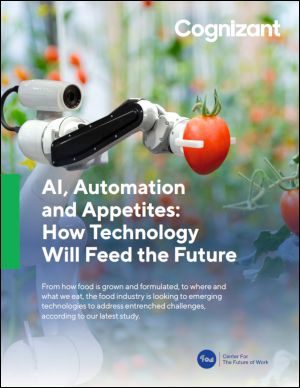Ungated Post | 10 Oct 2019
AI, Automation, and Appetites: How Technology Will Feed the Future

Humanity feeds itself thanks to generations of innovation across a complex system of systems including agriculture, shipping and distribution, processing, and retail. As growing complexity and other risks threaten business as usual, this mega-system must prepare for an era of rapid disruption.
Emerging technologies like analytics, automation, and artificial intelligence (AI) are helping the food sector respond to these threats—even as they accelerate disruption.
To better understand the relationship between food and technology, Oxford Economics worked with Cognizant’s Center for the Future of Work to survey 304 food industry leaders across the globe to learn how they are preparing for the challenges and opportunities ahead.
Our Thought Leadership team produces original, evidence-based research made accessible to decision-makers and opinion leaders. Principals for this project included:
Oxford Economics’ team is expert at applying advanced economic tools that provide valuable insights into today’s most pressing business, financial, and policy issues.
To find out more about our capabilities, contact:
EMEA
Paul Donnelly
020 3910 8000
Email
Americas
Diantha Redd
+1 (646) 503 3052
Email
Related Services

Post
The economic impact of abandoning the WTO
Oxford Economics have been commissioned by the International Chamber of Commerce (ICC) to provide an independent assessment of the economic impact of WTO dissolution. This report details our findings and the assumptions underpinning our analysis.
Find Out More
Post
The economic impact of the sports activities of public service media
This study shows how the sports activities of public service media supported €4.5 billion of GDP and 57,000 jobs across 31 European countries in 2022. The report also highlights wider economic benefits of public service media sports coverage, such as the way in which it leverages sponsorship income for sports bodies.
Find Out More
Post
Global Trade Education: The role of private philanthropy
Global trade can amplify economic development and poverty alleviation. Capable leaders are required to put in place enabling conditions for trade, but currently these skills are underprovided in developing countries. For philanthropists, investing in trade leadership talent through graduate-level scholarships is an opportunity to make meaningful contributions that can multiply and sustain global economic development.
Find Out More